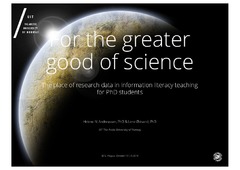| dc.description.abstract | In addition to the demanding task of writing a thesis, PhD students face the challenge of balancing the roles as “good scientists” and “good academics”, which in some cases might conflict (Carter, 2015). They are expected to carry out a laborious research project where they are responsible for keeping in line with the norms and values of research ethics, all while building the foundation for their research career, where a “publish or perish” culture is currently ruling. In addition, requirements for data management and sharing have started to rise.
Information literacy teaching has experienced a shift in focus in latter years. If libraries traditionally have devoted their time to teaching undergraduate students the hows of using sources, they now spend more time on the whys and the importance of being information literate for the acquisition of knowledge. At our university, this shift has led to reflection upon how the information literacy needs persist, but gradually change, from undergraduate to PhD level. In 2015, we launched the cross-disciplinary seminar series Take control of your PhD journey (cf. https://uit.no/ub/laringsstotte#linje2) to meet these needs. This seminar series widens the traditional scope of information literacy, taking academic integrity to include the ethics of open science. Focusing on the practical use as well as the theory behind, open access thus constitutes a natural component of the course content we provide to our PhD students. Due to an increasing demand for information on research data, we are in the process of developing a separate seminar on the topic, which will be held in May this year.
During the seminar series, we will collect information on how PhD students reflect upon academic integrity and open science through open-ended questionnaires. They contain both questions with right/wrong answers to show their understanding, and opinion scales to show their thoughts on, e.g., the importance of “prestige” – often linked to publications in journals with high impact factor. The questionnaires will be sent before and after each seminar so that we can find if their opinions have changed, and what they have learned at the seminar.
In this presentation, we aim to assess the attitudes that our PhD students display towards open access research data, and their skills relating to searching and publishing data. We view these findings in light of the current definition and further development of information literacy teaching at higher academic levels. | en_US |


 English
English norsk
norsk